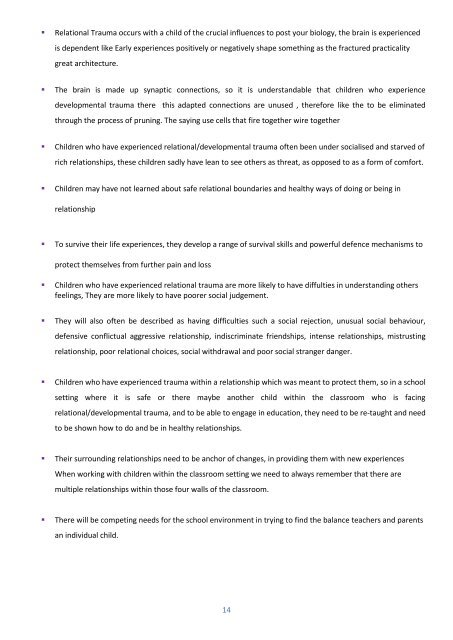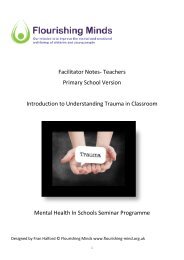Facilitator Notes Understanding Trauma in Classroom Teacher Primary Version final June
Create successful ePaper yourself
Turn your PDF publications into a flip-book with our unique Google optimized e-Paper software.
• Relational <strong>Trauma</strong> occurs with a child of the crucial <strong>in</strong>fluences to post your biology, the bra<strong>in</strong> is experienced<br />
is dependent like Early experiences positively or negatively shape someth<strong>in</strong>g as the fractured practicality<br />
great architecture.<br />
• The bra<strong>in</strong> is made up synaptic connections, so it is understandable that children who experience<br />
developmental trauma there this adapted connections are unused , therefore like the to be elim<strong>in</strong>ated<br />
through the process of prun<strong>in</strong>g. The say<strong>in</strong>g use cells that fire together wire together<br />
• Children who have experienced relational/developmental trauma often been under socialised and starved of<br />
rich relationships, these children sadly have lean to see others as threat, as opposed to as a form of comfort.<br />
• Children may have not learned about safe relational boundaries and healthy ways of do<strong>in</strong>g or be<strong>in</strong>g <strong>in</strong><br />
relationship<br />
• To survive their life experiences, they develop a range of survival skills and powerful defence mechanisms to<br />
protect themselves from further pa<strong>in</strong> and loss<br />
• Children who have experienced relational trauma are more likely to have diffulties <strong>in</strong> understand<strong>in</strong>g others<br />
feel<strong>in</strong>gs, They are more likely to have poorer social judgement.<br />
• They will also often be described as hav<strong>in</strong>g difficulties such a social rejection, unusual social behaviour,<br />
defensive conflictual aggressive relationship, <strong>in</strong>discrim<strong>in</strong>ate friendships, <strong>in</strong>tense relationships, mistrust<strong>in</strong>g<br />
relationship, poor relational choices, social withdrawal and poor social stranger danger.<br />
• Children who have experienced trauma with<strong>in</strong> a relationship which was meant to protect them, so <strong>in</strong> a school<br />
sett<strong>in</strong>g where it is safe or there maybe another child with<strong>in</strong> the classroom who is fac<strong>in</strong>g<br />
relational/developmental trauma, and to be able to engage <strong>in</strong> education, they need to be re-taught and need<br />
to be shown how to do and be <strong>in</strong> healthy relationships.<br />
• Their surround<strong>in</strong>g relationships need to be anchor of changes, <strong>in</strong> provid<strong>in</strong>g them with new experiences<br />
When work<strong>in</strong>g with children with<strong>in</strong> the classroom sett<strong>in</strong>g we need to always remember that there are<br />
multiple relationships with<strong>in</strong> those four walls of the classroom.<br />
• There will be compet<strong>in</strong>g needs for the school environment <strong>in</strong> try<strong>in</strong>g to f<strong>in</strong>d the balance teachers and parents<br />
an <strong>in</strong>dividual child.<br />
14



